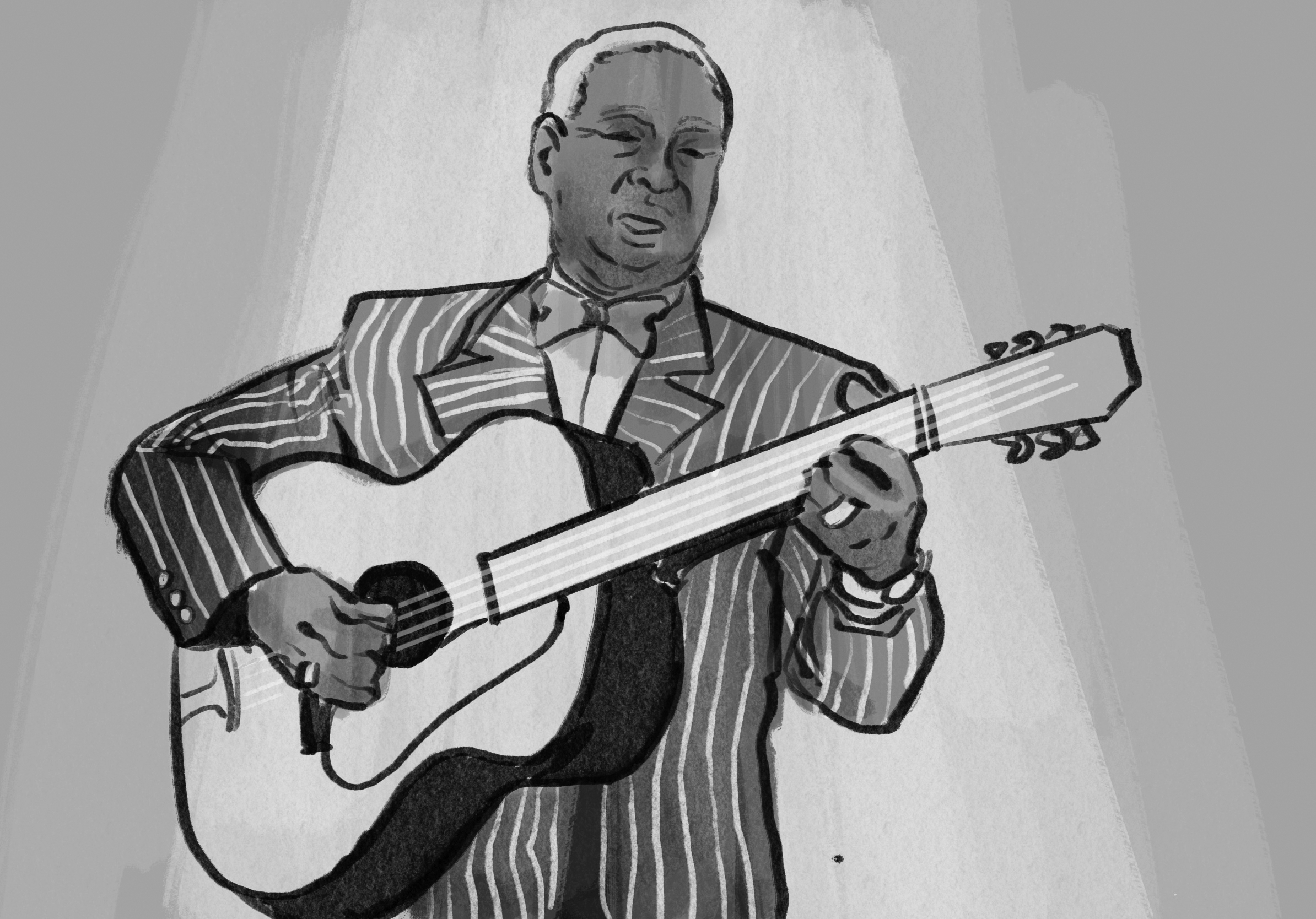House of the Rising Sun: Leadbelly, 1944
September 30, 2022
 Kyra Tan
Kyra TanBy the mid-1940’s, “House of the Rising Sun” had existed for decades as a folk standard, but when Huddie Ledbetter (a.k.a. Leadbelly), a giant of the Mississippi Delta Blues and 12-stringed guitar virtuoso, picked up the track, the song’s acclaim began to approach echelons beyond the merits of canonization.
A Black man living in Jim Crow South, Leadbelly was intimately acquainted with the despair of a protagonist-in-crisis: despite his obvious musical acuity and, later, acclaim, the artist served an egregious sentence on Angola Farm Prison-Plantation after being implicated in a party brawl early on in his career. During this stint in prison, he was “discovered” by ethnomusicologist Alan Lomax on one of Lomax’s field studies of American Blues music that were being funded by the Library of Congress. An opportunity to record arose, but, for all his prowess, Leadbelly was met with a tepid response. However, he continued to travel with Lomax, eventually finding himself in Greenwich Village where he made a particular impression on one young folk singer who I’ll discuss in the coming weeks. Leadbelly and Lomax’s partnership would go on to produce an essential recorded biography of American Folk music. By virtue of just listening to Leadbelly, a raconteur and a progenitor of the richest American folk traditions, the nation’s hazy lore might come into focus.
Leadbelly’s first recording of the song in question can be found on the B-side of his 1944 project “(Black Girl) Where Did You Sleep Last Night,” (you might recognize the title from one Nirvana: Unplugged opener) released on the New York-based label Musicraft Records. This studio cut is the first instance of “House of the Rising Sun,” a composition of nearly genealogically-transmitted chords and verse, broaching the industrial world of music. To record it is to typify—to standardize—a piece of art that previously sustained itself in the effortless slipstreams of generational wisdom. This is a curious impulse.
Leadbelly’s up-tempo paraphrase of Clarence Ashley’s recording shifts the “House of the Rising Sun” narrative occupation from one man’s downfall to a prophetic forewarning spurred by the House’s looming threat. For Leadbelly, the rambler is no longer the subject of our pity. Rather, by way of a pronoun change, our attention is redirected towards an alternative female protagonist struck by the woes of being involved with such a rambling man. Despite the levity of Ledbetter’s 12-bar blues and the persisting major chordal arrangement (an idiomatic I – IV – V progression in C major—only a nominal digression from Ashley’s identical diatonic progression transposed into E major), his is a much more menacing mythology. Here, our narrator has already fallen victim to the House’s barbed interior and is issuing an ominous warning to the women that are bound to follow her. The cut is deceivingly jaunty in Leadbelly’s nimble hands, but as this track begins to cultivate its surrounding lore, its propagators exhibit some leaden disposition.
So, what happens to a folk song when it becomes affixed as the object of an industrial public’s wanton intrigue? In the case of “House of the Rising Sun,” its proliferation correlates with some growing communion with that place beyond redemption.
“In New Orleans”/ “House of the Rising Sun”:
There is a house in New Orleans
You call the Rising Sun
It’s been the ruin of many a poor soul
And me, oh God, I’m one
If I’d listened to what mama said
I’d be at home today
Being so young and foolish, poor girl
I let a gambler lead me astray
My mother she’s a tailor
Sews those new blue jeans
My sweetheart, he’s a drunkard, Lord God
He drinks down in New Orleans
He fills his glasses to the brim
Passes them around
The only pleasure that he gets out of life
Is a hoboin’ from town to town
The only thing a drunkard needs
Is a suitcase and a trunk
The only time that he’s half satisfied
Is when he’s on a drunk
Go and tell my baby sister
Never do like I have done
Shun that house down in New Orleans
That they call that Rising Sun.
It’s one foot on the platform,
One foot on the train.
I’m going back down to New Orleans
To wear my ball and my chain
My life is almost over
My race is almost run
Going back down to New Orleans
To that house of the Rising Sun

Comments
Before submitting a comment, please review our comment policy. Some key points from the policy: